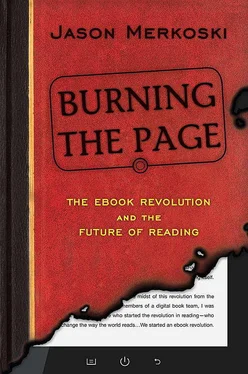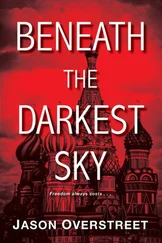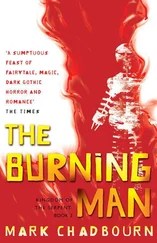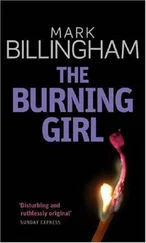Clicking the link at the end of each “bookmark” unlocks a sequence of surprises and gifts—starting with a personalized autograph, bonus chapters, unexpected objects falling out from between the “pages” of the book, ways to carry on the conversation with other readers, and a personalized message upon completing the book. You need to click each link to unlock all the surprises.
I look forward to talking to you, because the greatest revolutionaries in the ebook revolution are the readers. We’re all part of this revolution, and we’re all mourning the culture of print books in our own ways. Everyone I talk to cares about the written word and has a strong opinion on where books are headed. Everyone has a story about books and ebooks and how they’ve changed our lives. So what’s your story? Click the link below to share it with me and other readers—and get your autograph too!
http://jasonmerkoski.com/eb/1.html
If you’ve never used a Kindle, imagine a device the size of a book that can wirelessly download ebooks from Amazon’s online store. These ebooks can be read just like regular books—you can turn pages, add bookmarks, see the cover, and go to the table of contents. But unlike regular books, ebooks also let you resize the text to make it bigger or smaller. Ebooks let you look up a word right there on the page to see its definition. Kindles are part computer, part book, and part cloud.
The packaging on the original Kindle box shows an illustrated history of the written word. Starting from the left-hand side, you see symbols in hieroglyphics and cuneiform, then you see Greek and Roman letters carved in stone, then woodblock medieval printing, finally followed on the right-hand side of the box by letters in modern alphabets on paper. The story of the written word is a story of evolution. In fact, the history of printing is one of a decline in durability and a rise in convenience.
Printing started 6,000 years ago with cuneiform tablets from the Middle East. These were created from wedges carefully cut from mud, fired in a kiln, and made into tablets. The process had more in common with sculpture than writing, but it was durable. We’re still uncovering clay tablets from all over that region. I’d like to think that printing was invented to tell the stories of noble heroes and the elder goat-gods with their white beards, but no, most of these tablets were just bills and invoices. For example, in October 2012, an archive of 24,000 cuneiform business documents was found in central Turkey. It’s a 6,000-year-old hoard of checks, tax forms, and loan notes.
Almost as old as clay tablets is papyrus, which is made from woven reeds like those that grow along the Nile. They’re not as durable as clay and gradually decay, although in the Egyptian desert, you can still find fragments of papyrus preserved by desert sands and dust through the subsequent millennia. As writing boomed, the supply of reeds started dwindling, and in the fifth century BC, a new type of writing technology was developed, in which animal skins were made into parchment scrolls. Parchment lasts about a thousand years, and being made of animal skin, it’s quicker to decay than papyrus and quick to crack, as anyone who owns a leather jacket or suede pants knows.
Paper was invented next, an even more convenient technology for printing, because wood pulp could be mashed up, laid out on racks to dry, and then cut into many thin sheets. It was much cheaper to make than any previous technology, but less durable. Even now, almost 2,000 years after its invention, paper only lasts about 500 years at best before yellowing and brittling to dust. Even the use of metal salts to make more durable acid-free paper isn’t a recipe for immortality.
Over the last millennium, there have been other regional innovations in print technology, such as the use of palm leaves in Southeast Asia or birchbark among some of the Native Americans, but by and large, human civilization has predominantly used paper until now.
The history of book printing is wormy with false starts. For example, woodblock printing emerged around 200 AD in China before being rediscovered in Europe more than a thousand years later. Likewise, movable type was discovered and used to print books in Korea seventy-five years before it was rediscovered by Johannes Gutenberg, the credited inventor of modern printing. But it wasn’t a single invention alone that sparked the blossoming of books in the Middle Ages. Gutenberg combined many inventions including moveable type, as well as the printing press and oil-based inks. The combination of all of these allowed book printing as we know it to succeed.
We don’t know how he came up with these ideas and merged them together. In fact, we don’t even know what Gutenberg looked like. The earliest illustrations of him didn’t emerge until well after he died. Except for his innovation, he’s an almost absolute enigma, except for the occasional lawsuit filed against him. It would have been amazing if Gutenberg or one of his workers had written about making the first books, but they never did, or if so, their writing didn’t endure. There’s no written record of Gutenberg’s workshop, but I imagine it would have been a lot like where newspapers were once printed, before the linotype and lead type were replaced by photography and digital typesetting.
The technology Gutenberg used in the 1450s was almost the same as the newspaper technology at my father’s company three hundred years later in the latter half of the twentieth century. When I was a kid, I used to visit my father’s newspaper on weekends. I would see enormous linotype machines that looked like a cross between typewriters and church organs, overheated machines belching steam while their operators sat with their burly 1970s mustaches and sweat-stained T-shirts, working to produce metal type.
The type would then be put into racks and ratcheted in with wrenches. Each line of the newspaper would be set with spacers between lines, and then the whole rack would be moved on an enormous system of pulleys to a room where it would be cast in molten metal, into a metal plate that could finally be used to print a page of newsprint on rolls of paper with ink.
The pressmen who worked there had mangled fingers and ink stains like semipermanent tattoos on their arms. They’d be smoking cigarettes from the moment they came to work until they left at 4:00 a.m., working late every day to print the news. In the lunchroom, they’d munch on hot dogs and donuts, the smell of sauerkraut as thick as the ink stains on the walls.
I imagine Gutenberg’s workshop to be somewhat similar, with ink-stained and metal-scarred men working in dark rooms, sharing their lunches at a dark table in the back, drinking beer together. And maybe there’s a dog or two in the corner, nuzzling at some grunt sleeping off the beer he had for lunch. The workshop would have been smoky from lampblack, boiling linseed oil, and cauldrons of molten lead.
You would hear the sounds of the press as it was squeezed, like a grape press to make wine; you’d hear the groans of grunts as they turned the screws of the printing presses, the creaking of wet wood against metal. Scraps of books and Bibles would litter the floor, along with pages from calendars showing the best time to do bloodlettings or letters from the Pope printed to rally support against the Turks. There would be splurts of hardened metal on the floor and rows of metal slugs. With a word as soft and slippery as “slug,” it’s hard to imagine them being made out of metal, but a slug is a line of type made from copper, all the letters neatly arranged and ready to be inked for printing.
In my mind, the workshop would be divided into sections for casting molten metal, for pressing it into paper with ink, and for the racks of moveable type that could be maneuvered into place to set each line by laborious line for whatever was being printed at the time. In Gutenberg’s day, it was too expensive to print an entire page of a book from one copper plate, which is how they did it at the newspaper when I was a child.
Читать дальше












